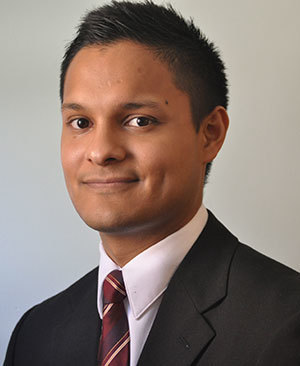 Robert Vargas
Robert Vargas
Robert Vargas, an urban sociologist whose research focuses on violence and health care, is joining Notre Dame’s Department of Sociology this fall as an assistant professor.
Vargas, who will also be a faculty affiliate in the Institute for Latino Studies at Notre Dame, was previously on the faculty at the University of Wisconsin-Madison and a fellow at the Robert Wood Johnson Foundation at Harvard University.
Rory McVeigh, professor and chair of the department, said Vargas is a “rising star” working at the cutting edge of the discipline.
“He is at the forefront of a group of young sociologists who are applying new tools and new ideas to examine the types of questions that once formed the core of what would become a uniquely American style of sociological analysis,” McVeigh said. “His work is generating new insight into these important questions, examining complex interactions involving community residents, nonprofit organizations, police, and politicians.”
Vargas’ first book, Wounded City: Violent Turf Wars in a Chicago Barrio (Oxford University Press), will be released May 1. In it, Vargas argues that competition among political groups contributes to the persistence of violence just as much as the competition among street gangs.
He contends that city ward boundaries were deliberately drawn to undermine the political power of poor residents, and these political acts have undermined collective efforts to reduce violence.
“The gerrymandered portions of the neighborhood I studied have the highest rates of violence, and we can see that going back three or four decades,” Vargas said. “These political conflicts have consequences for where violence is concentrated in the city.”
The Costs of Tough-on-Crime Solutions
While he was a graduate student at Northwestern University, Vargas realized that even the best-intentioned community aid programs are derailed by the threat of violence.
One particular incident he saw at a local neighborhood center stuck with him.
“All of the kids were scrambling to get a ride home because they had heard there was a gang initiation going on. The program was right in the middle of that turf,” Vargas said. “You can have all these great programs for kids, but if you don’t understand the geography of the neighborhood or the gangs, they can only do so much.”
That experience stoked Vargas’ interest in how local governments work with low-income populations to try and reduce violence.
Instead of confronting the deep political cleavages dividing the city, Vargas said, local governments have focused on reducing violence through programs targeted at residents or enhanced police crackdowns on gangs.
“The tough-on-crime approaches policy makers are taking, from a social science standpoint, are not working,” Vargas said. “The social and economic costs of imposing such a heavy-handed social order in Chicago’s communities are enormous.”
The Obstacles to Affordable Health Insurance
Vargas’ next project investigates the factors that keep people from utilizing the Affordable Care Act, one of the largest expansions of the social safety net in decades.
The law subsidizes health insurance for low-income citizens, but Vargas is finding that many are not taking advantage of it because of previous personal experiences with government programs.
Understanding the consequences of interactions between government bureaucrats and low-income citizens, Vargas believes, could lead to better implementation and outreach for the Affordable Care Act.
“The ACA arrived after decades of federal cuts to the social safety net for the poor,” Vargas said. “It presents this interesting policy problem of how to engage people to sign up for government-subsidized health insurance after decades of bad experiences, long lines, and stigma connected to the welfare system.”
Vargas said he believes being closer to Chicago will help his research, but he is most excited about the opportunity to work with the Institute for Latino Studies and a young core of highly regarded faculty across campus.
“I was just floored by all Notre Dame has been able to accomplish by recruiting top scholars to the Department of Sociology, becoming editors of the discipline’s premier journal, and showing a strong commitment to diversity,” Vargas said. “Notre Dame is becoming a premier place to conduct social science research, especially on Latino issues. I wanted to be a part of that.”
Originally published by Brian Wallheimer at al.nd.edu on March 31, 2016.
Originally published by at al.nd.edu on March 31, 2016.